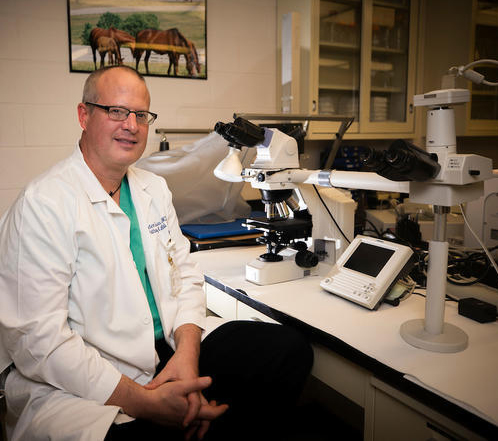Dementia can have causes other than Alzheimer’s, and a UK doctor is co-chairing an international effort to learn more about it

Dr. Peter Nelson (University of Kentucky photo)
—–
Dementia can have causes other than Alzheimer’s disease, so the two terms shouldn’t be used interchangeably. But researchers have a lot to learn about the other causes, and a researcher at the University of Kentucky is helping lead an international effort on one major cause.
“More than 200 different viruses can cause the common cold,” Dr. Peter Nelson of UK’s Sanders-Brown Center on Aging told Davis in an interview on WUKY. “So why would we think there is just one cause of dementia?”
Nelson and Nina Silverberg, director of the Alzheimer’s Disease Centers Program at the
National Institute on Aging, part of the
National Institutes of Health, are heading an international group of researchers who will better define a newly-named dementia, limbic-predominant age-related TDP-43 encephalopathy, or LATE. (
TDP-43 is a protein that helps cause dementia.)
LATE “may seem the same as Alzheimer’s to the lay person, but the disease inside the brain looks very different,” Dr. Greg Davis and Laura Wright report for the university. LATE “tends to appear in the oldest old,” those over 85. “The incidence of LATE is almost as prevalent among the oldest old as Alzheimer’s.”
Nelson’s research group published
a paper in the journal
Brain reporting that LATE “progresses more gradually than Alzheimer’s,” WUKY reports. “However, LATE combined with Alzheimer’s—which is a common combination—appears to cause a more rapid decline than either would alone.”
LATE probably responds to different treatments than Alzheimer’s, “which might help explain why so many past Alzheimer’s drugs have failed in clinical trials,” Nelson said. “Now that the scientific community is on the same page about LATE, further research into the ‘how’ and ‘why’ can help us develop disease-specific drugs that target the right patients.”
Silverberg said many of the people who have enrolled in clinical trials for Alzheimer’s drugs probably didn’t have amyloid, which interferes with thinking “Not all of the people we thought had Alzheimer’s have it,” she said. “It is very important to understand the other contributors to dementia.”
Nelson likens the group’s work to Benjamin Franklin’s supposed “discovery” of electricity.
“People had seen lightning before, of course, but Franklin helped formalize a concept that augmented our ability to study electricity,” Nelson said. “By developing a sense of scientific focus around these data, we hope to jump-start a broad field of work to advance our understanding of this form of dementia and, ultimately, to open new opportunities for treatment.”
